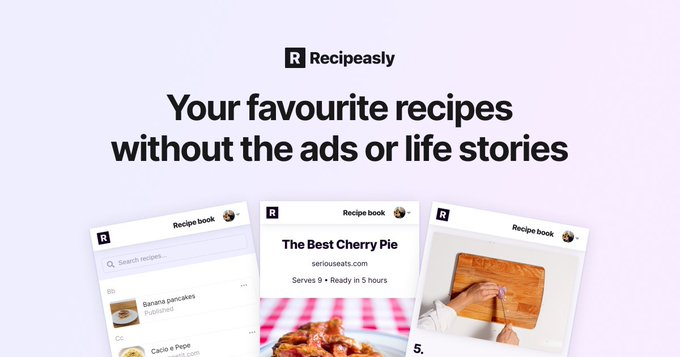Here’s one for you: A new website meant to make cooking from web-based recipes easier was taken down last week just hours after launching following complaints from other sites that it was stealing ad revenues and infringing copyrights. Here’s the story the way we heard it. What do you think?
 The home page for the (now defunct) Recipeasly.com website. The online ‘tool’
The home page for the (now defunct) Recipeasly.com website. The online ‘tool’
filtered out ‘irrelevant content’ and ads to make other bloggers’ recipe sites more usable.
Website creator Tom Redman seemed truly surprised – and upset – to learn that food bloggers were outraged by his newest creation, a tool, “designed to ‘fix online recipes’ by removing ‘ads and life stories’ when users imported external links,” a BBC online story reports.
Called recipeasly.com, the new site was designed to filter out ads and author ‘life stories’, streamlining the content and making it easier to use online recipes. Users (who knew about the site and tried it during the less-than-a-day it was up) loved it:
“Please don’t bow to the criticism, this site is an answer to my prayers,” one supporter said.
“We all hate shifting [sic] through lifestyle guru stuff to see if we need one egg or two,” another commented.
Quick to respond…
Tom responded quickly and in severely contrite detail:
“We have nothing but respect and admiration for the time, money and effort that go into creating great recipes & websites. We don’t want to minimise the results for all that hard work,” Tom tweeted back.
“We realise we’re not demonstrating the huge respect we have for recipe creators. We missed the mark big time today and we’re sorry.”
And that seemed to satisfy bloggers who complained that his invention infringed their copyrights and ‘robbed’ them of revenues on which some of them base their primary incomes.
… But emphasized some relevant points
First, he wrote in his own Twitter account, recipeasly.com had no revenues nor generated any profit. He also made it clear that the site was designed to drive traffic through links on the site, “similar to if a user had printed the recipe or copied it into a [word processing document].”
My take
As someone with more than 40 years of experience as a professional journalist, I know the rules about plucking small snippets of text or borrowing quotes from other folks’ articles giving them appropriate credit (ad sometimes, even links) for their work. I’m always careful to follow those rules as I’d expect others to do when re-purposing my original content.
However, I’m still thinking about Tom Redman’s precepts about ‘streamlining’ other folks’ websites for third-party users apply, in the greater scheme of things.
Bloggers like Binny Shah-Patel, food writer and creator of Binny’s Food and Travel blog, told the BBC recipeasly.com took the “heart and soul” out of recipes:
“If I shared a recipe that was inspired by something my grandmother fondly made for me growing up in Kenya, it is now one of the ways I remember my grandmother now that she has passed away, and I can’t even go home because of Covid. […] I would want others to know about the inspiration behind the recipe and what it means to me every time I make it and eat it, so that they too can appreciate it that much more and perhaps learn a little about my background and grandmother in the process.”
I have to agree that Redman’s invention does disrespect the personal feelings of recipe bloggers who want to pay respects to those who have inspired them, especially family members who have passed on. I also respect the desires of those who want to share the history and backgrounds of recipes and culinary traditions from which the recipes they share derive. But when stuff like that punctuates the actual recipes when I’m actually trying to cook from them, It can also be very annoying – let alone dangerous for the outcome of a recipe, when timing is of the essence – for the nonessential intrudes.
The core of the issue…
Originating food bloggers complain about copyright infringement; but recipeasly doesn’t actually repost the work of others; it simply shows the essential content to those who choose to import a recipe web page through it for their own use.
My main question, then, is: How does recipeasly.com, as a ‘tool’, differ from the thousands of so-called ‘ad blockers’ promoted on the web to help users make their online experiences less frustrating and more satisfying?
Perhaps, if Redman had left the site up as a challenge to the complainers, that would have generated some additional online discussion which would have made that point clearer…
~ Maggie J.

